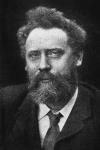Quotes by William Ernest Henley
Men there have been who have done the essayist's part so well as to have earned an immortality in the doing; but we have had not many of them, and they make but a poor figure on our shelves. It is a pity that things should be thus with us, for a good essayist is the pleasantest companion imaginable.
Now, to read poetry at all is to have an ideal anthology of one's own, and in that possession to be incapable of content with the anthologies of all the world besides.
There are two men in Tolstoy. He is a mystic and he is also a realist. He is addicted to the practice of a pietism that for all its sincerity is nothing if not vague and sentimental; and he is the most acute and dispassionate of observers, the most profound and earnest student of character and emotion.
Shakespeare often writes so ill that you hesitate to believe he could ever write supremely well; or, if this way of putting it seem indecorous and abominable, he very often writes so well that you are loth to believe he could ever have written thus extremely ill.
Shakespeare and Rembrandt have in common the faculty of quickening speculation and compelling the minds of men to combat and discussion.
It is the artist's function not to copy but to synthesise: to eliminate from that gross confusion of actuality which is his raw material whatever is accidental, idle, irrelevant, and select for perpetuation that only which is appropriate and immortal.
Essayists, like poets, are born and not made, and for one worth remembering, the world is confronted with a hundred not worth reading. Your true essayist is, in a literary sense, the friend of everybody.
The life of Dumas is not only a monument of endeavour and success, it is a sort of labyrinth as well. It abounds in pseudonyms and disguises, in sudden and unexpected appearances and retreats as unexpected and sudden, in scandals and in rumours, in mysteries and traps and ambuscades of every kind.
Balzac's ambition was to be omnipotent. He would be Michelangelesque, and that by sheer force of minuteness. He exaggerated scientifically, and made things gigantic by a microscopic fulness of detail.
This is the merit and distinction of art: to be more real than reality, to be not nature but nature's essence.
It matters not how strait the gate, How charged with punishments the scroll; I am the master of my fate: I am the captain of my soul.
In the fell clutch of circumstance, I have not winced nor cried aloud: Under the bludgeoning of chance my head is bloody, but unbowed.
I am the master of my fate; I am the captain of my soul.
Madam, Life's a piece in bloom death goes dogging everywhere: She's the tenant of the room he's the ruffian on the stair.
A late lark twitters from the quiet skies: And from the west, Where the sun, his day's work ended, Lingers as in content, There falls on the old, gray city An influence luminous and serene, A shining peace.
Out of the night that covers me, Black as the Pit from pole to pole, I thank whatever gods may be For my unconquerable soul. In the fell clutch of circumstance I have not winced nor cried aloud. Under the bludgeonings of chance My head is bloody, but unbow'd. Beyond this place of wrath and tears Lies but the horror of the shade, And yet the menace of the years Finds, and shall find me, unafraid. It matters not how strait the gate, How charged with punishments the scroll, I am the master of my fate: I am the captain of my soul.






